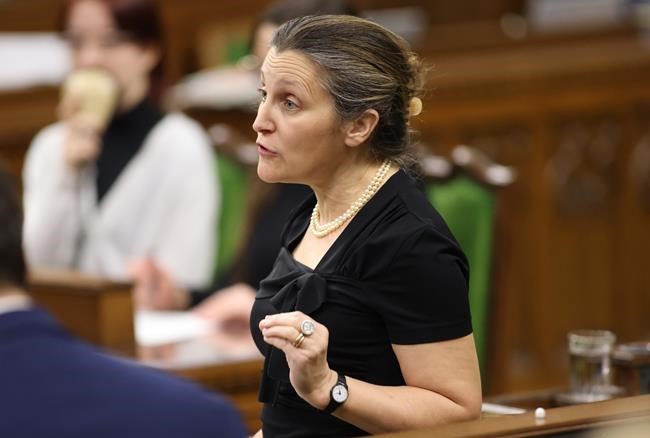OTTAWA ‚Äî As the federal government readies its spring budget, a climate group is urging Ottawa to pursue a "made-in-Canada" response to U.S. clean energy incentives.¬Ý
The Canadian Climate Institute published a report on Tuesday with recommendations for the federal government on how to respond to the U.S. Inflation Reduction Act passed last summer.
The institute says the government shouldn't try to match the incentives and subsidies offered by the U.S., and should instead tailor its measures for Canada.
The Inflation Reduction Act, signed into law last August by U.S. President Joe Biden, invests nearly US$400 billion in everything from critical minerals to battery manufacturing, electric vehicles and clean electricity, including hydrogen.
"To compete with the Inflation Reduction Act, Canada should not try and replicate it," Marisa Beck, the institute's clean growth director, told reporters on Tuesday.
Finance Minister Chrystia Freeland has signalled that the March 28 budget will include ways to keep Canada competitive as countries transition their economies to cleaner energy and technologies.
"Our friends and partners around the world, chief among them the United States, are investing heavily to build clean economies," Freeland said in Oshawa, Ont., on Monday.
"Today and in the years to come, Canada will either capitalize on this historic moment … or we'll be left behind as the world's democracies build the clean economy of the 21st century."
The federal government took the first step in its push to keep Canada competitive by introducing new federal tax credits for clean technology and low-emitting hydrogen production in its fall economic statement last November.
The upcoming budget is expected to outline how Canada plans to grow and transition to a clean economy.
In an interview on Tuesday, Unifor president Lana Payne said Canada can't compete dollar-for-dollar with the U.S., since its economy is much larger.
"But we have to do enough to make sure that we're still in the game and able to attract investment here," the union leader said.
Canadian oil and gas companies have been arguing that their industry is at a competitive disadvantage with the U.S., claiming it's impossible to compete.¬Ý
Earlier this month, Calgary-based fuel producer Parkland Corp. announced it will not be going ahead with its plan to build a stand-alone renewable diesel complex at its refinery in Burnaby, –°¿∂ ”∆µ, in part because the company believes the incentives offered by the IRA give an advantage to producers south of the border.
The Pathways Alliance, an oilsands industry group, has also argued that its proposed $16.5-billion carbon capture and storage transportation line project is currently at a competitive disadvantage to U.S. carbon capture projects.¬Ý
In the 2022 budget, the federal government allocated $2.6 billion over five years to a tax credit for companies investing in carbon capture and storage projects.¬Ý
Carbon capture and storage technology traps greenhouse gas emissions from industrial sources and stores them deep in the ground to prevent them from being released into the atmosphere.
The climate institute says Canada should pursue targeted policies that don't over-subsidize industry but instead support projects to benefit society that the private sector wouldn't pursue on its own.
Beck, who co-authored the group's report, said Canada's carbon pricing policy already gives it a competitive advantage by incentivizing private investment in decarbonization.
"A lot of the work that in the U.S. has to be done through very generous, broad subsidies ... is done by our carbon price," she said.
The report also says that the Canada Growth Fund, which will invest in clean energy projects using public dollars, should strive to to balance risk and return.
As part of the fund, the federal government is expected to include contracts for difference as an investment tool, which would give reassurance to investors that future changes to the federal carbon price would not affect their returns.¬Ý
The measure is designed to guarantee that investors will still see the benefit in investing in decarbonization, even if a future federal government decides to reduce or nix the carbon price.¬Ý
The report suggests that contracts for difference could, in turn, reduce the likelihood of a future government scrapping the price on carbon ‚Äî since Ottawa would be liable to pay the difference.¬Ý
In addition to offering the right kinds of incentives, the report also urges the federal government to plan to wind down supports for the private sector once projects are profitable.
"Long-term commitments over 10 (to) 15 years, of course, provide a lot of certainty for investors. But they can become really costly if it ends up that the projects are being over-subsidized," Beck said.
This report by The Canadian Press was first published March 21, 2023.
Nojoud Al Mallees, The Canadian Press



